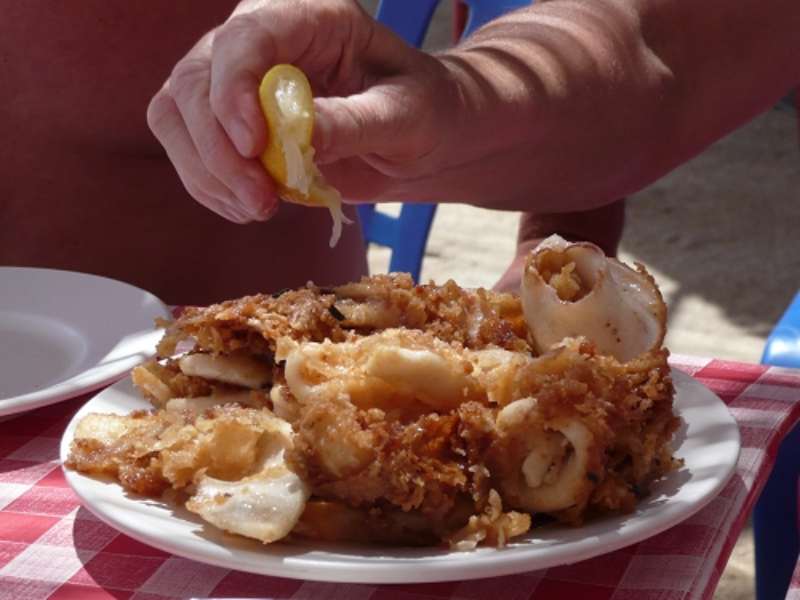
<Back to contents> <Next chapter>
14 FOOD (and drink!)
I like to eat. In fact, you could say that I live to eat rather than eating to live.
Greece, like most northern Mediterranean countries, has a wonderful cuisine.
It is also influenced by Middle East cuisine and has had the “benefit”
of Turkish occupation for 400 odd years, which left a legacy of good Turkish
cooking as well.
I could fill another couple of books with great recipes from Greek cooking,
but many others have already done so. One of our favourite Greek cook books
is, "The olive and the caper" - Adventures in Greek cooking, by Susanna
Hoffman. It has excellent recipes from all over Greece, but garnished with wonderful
stories from, and descriptions of, the women who taught her the recipes. It
starts with, "You are invited to savour an array of dishes that have welcomed
visitors for countless centuries". I wish I had written this book!
Greek cookery is mostly based on that nectar of the gods, olive oil. As I have
mentioned elsewhere, the olive tree just keeps giving and giving, but the oil
is the most beautiful of gifts. Tasting warm, fresh pressed olive oil, on a
bit of charcoal toasted bread, has to be one of the most delicious sensations
in the world. Of course, you have to have grown and be pressing your own olives
to experience this, unless you have access to an olive oil press and some nice
charcoal toasted bread! I use olive oil with all my food, and even though Lida
is an amazing cook, I will sometimes add some fresh oil to my plate, just to
enhance the taste. It is extremely healthy and is probably the main reason why
the “Mediterranean diet” is considered the healthiest in Europe.
I have seen tourists turn their noses up at dishes swimming in olive oil thinking
that they are swimming in “grease”. “Grease” and animal
fats will heighten your risk of heart problems, whereas olive oil will lower
that risk! At the beginning of a session of drinking tsipouro and eating mezedes,
we will pour some olive oil on to our plates, season it with salt and pepper,
soak it up with bread and eat it. Delicious! And it helps line the stomach with
a layer of oil so that the alcohol does not affect you so much.
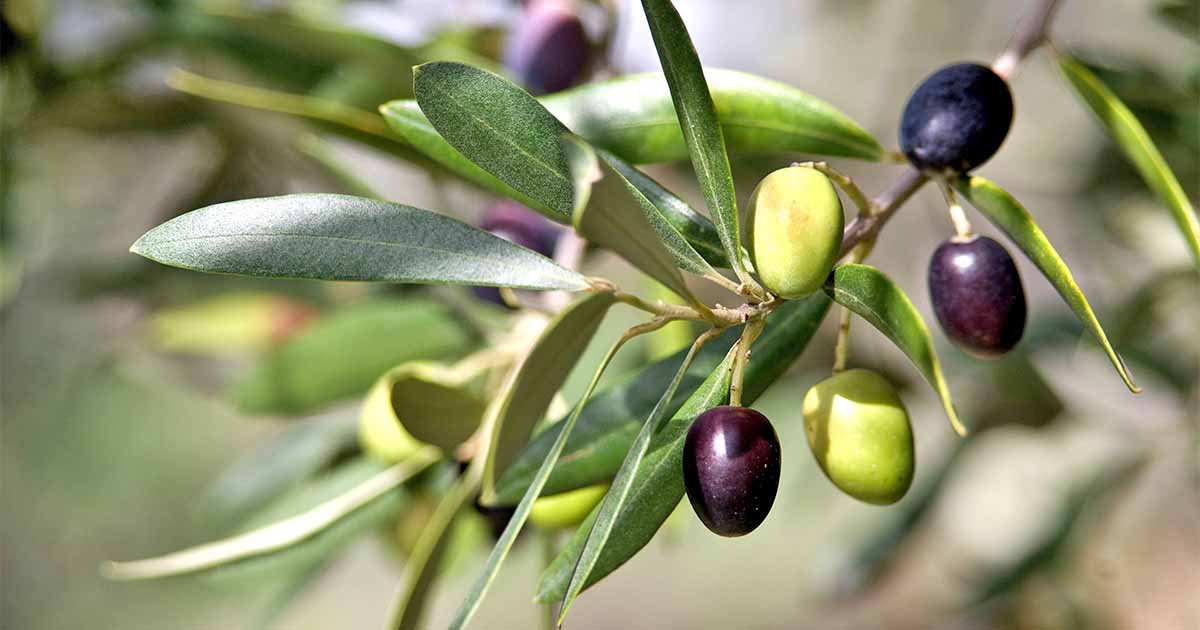
I have spoken about our love of tsipouro and mezedes often in this book. It
is a wonderful way to eat and drink, stretching a meal out over a few hours,
giving us plenty of time to talk and laugh. This is, of course, the favourite
way for Greeks to eat. For them, food without conversation, is not worth eating.
Drink is nice too, but not as essential as good company and good conversation.
Most mezes are traditionally sea food. The sea has provided food for thousands
of years and the preparation of it has become an art. Everything from octopus
to squid, shrimps to salads, are prepared in a hundred different ways, so that
each small plate of food that comes with each small bottle of tsipouro is never
the same twice in one session.
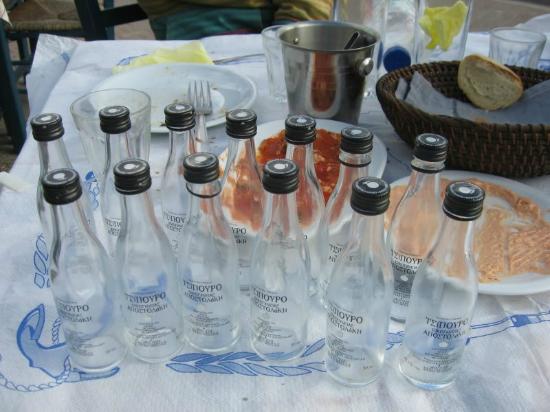
A normal tsipouro lunch
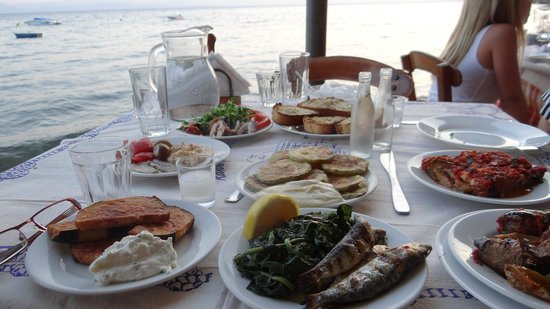
With a sellection of mezedes
Tsipouro (“Raki” in Crete and Turkey), if distilled correctly,
is a pure form of alcohol made mostly from grape juice, and as long as it is
not adulterated with “other flavours”, has a lovely delicate aroma
and taste, and will not give you a hangover. Many people drink it flavoured
with aniseed, as that is reminiscent of ouzo, but I have learned to drink it
as is, and sometimes see the “ouzo flavoured” drinkers with a hangover
after the event. To avoid hangovers in general, you should always dink lots
of water, and in Greece, water is always placed on the table as a matter of
course. Tsipouro should be cut with water half and half and, particularly in
the summer, one or two ice cubes should be added. This brings out any subtle
flavours and also allows the palate to taste the food rather than be “burnt”
by overly strong tsipouro. (Whisky drinkers are divided into 2 camps, one says
you should add about 40% water, the other says no water at all! I lean towards
the first, even a very good malt will benefit from a little added water.) I
cannot begin to describe the various mezedes that are offered, all I can say
is find a “Tsipourathiko” (a taverna specialising in tsipouro and
mezes) and start ordering tsipouro. The food will come (and keep coming!).
When we first came to Greece, everyone drank ouzo and only in a few small workers
cafes could you still get a small plate of food with the ouzo. Often just a
few olives or a slice or two of tomato and cucumber. For the rest, if you were
lucky, you got a small bowl of peanuts. Sometime about 30 years ago, in the
town of Volos, on the mainland, someone started to sell original tsipouro with
a nice seafood meze. Our favourite sailing captain, Theo, says that it was his
grandfather, who had originally come to Greece from Asia Minor in the swap of
Greeks and Turks in the early 1920’s, and brought with him the tradition
of drinking a “Raki” with a plate of good seafood. (These refugee
Greeks also bought “Rebetiko” music with them, which is a special
form of “Greek blues”. Nothing to do with the blues that comes from
USA but urban songs from the poorest Greek communities from the late 19th century
onwards, which became popular and adapted in Greece until the early 1960’s.
Often they were laments about what they had lost from their homes in Asia Minor.
The themes were always, love, joy and sorrow. There has recently been a revival
of interest in Rebetika songs.) The good food and convivial atmosphere of these
Tsipourathika started to make them very popular, and Volos became (and still
is) the center of this trend. Someone in Skiathos opened a small Tsipourathiko
and that proved so popular with the local Greeks that Tsipourathika started
to spring up everywhere. The competition keeps prices very reasonable (although
still more expensive than on the mainland), and also meant that the food had
to be good or the customers would go to the better ones. Businesses that act
as restaurants for the tourists in the season, run as Tsipourathika in the off
season, and the good ones are always packed.
I have now started to produce tsipouro from my own still, using our grape juice
or wine from a previous year that we haven’t got around to drinking (or
considered “not so good”). It is a fascinating process and takes
quite some time, so patience (which is not my strong suit) is required. The
first alcohol that boils off from the “brew” is lethal and needs
to thrown away (or used for rubbing alcohol). Likewise, the “lower wines”
(below 40% alcohol) should not be kept but can be used in the following distillation.
In fact, I throw these away as well as I want my “hooch” to be the
best it can be. I have also started to experiment with making whisky, but although
it is eminently drinkable, whisky aficionados will probably turn their noses
up at it. Ideally, it should cure for 3 years in an oak barrel and I have asked
some Romanian friends to see if they can find a small one for me. Whether I
can wait for 3 years is something we will find out!
At home, we eat an interesting combination of food of European, Greek (notice
that I do differentiate between Europe and Greece), Indonesian, Dutch, and Lida’s
fantasy. She never sticks to a recipe, just using whatever we have to hand and
her experience of what works well with what, to produce meals that always delight
me. I also cook but do not have Lida’s skills. My cooking is always in
a cast iron skillet and I start with browning onions and garlic in olive oil
while I am thinking about what else will go in. I often end up with nice, rich,
saucy dishes that go well with pasta, rice or potatoes. Lida’s favourite
pan is a cast iron wok in which she can stir fry, simmer, or steam a variety
of foods. Her stir fried food is renowned by all that have tasted it and is
never quite the same twice. We also love hot food and our home-grown chili peppers
will often be added to a dish. We take a Surinam mango chutney from Holland
whenever we visit, which has a very special taste and a fiery heat. Having fresh
vegetables from our garden always helps to make the meals delicious. There is
nothing like cutting a fresh lettuce and pulling a fat spring onion from the
ground for a salad, or plucking a fresh tomato or courgette straight off the
plant, and then eating them an hour later! All our produce from olive oil to
oranges are grown organically, so we know that what we eat is the very best
and tastiest that we can get. We make a lot of the wine that Lida (mostly) consumes.
I prefer tsipouro in the winter and beer in the summer, although in the winter,
a glass of good red wine also goes down very nicely. With our neighbours, we
also smoke meats and cheeses, and the results of this are usually sliced and
kept in vacuum packs, some frozen, some for (almost) immediate consumption.
Smoking adds a lovely flavour to food and is well worth the time and effort.
Our own olives are cured in various ways (pickled in brine or vinegar and olive
oil) and there is almost always a bowl on the table from which we browse as
we pass.
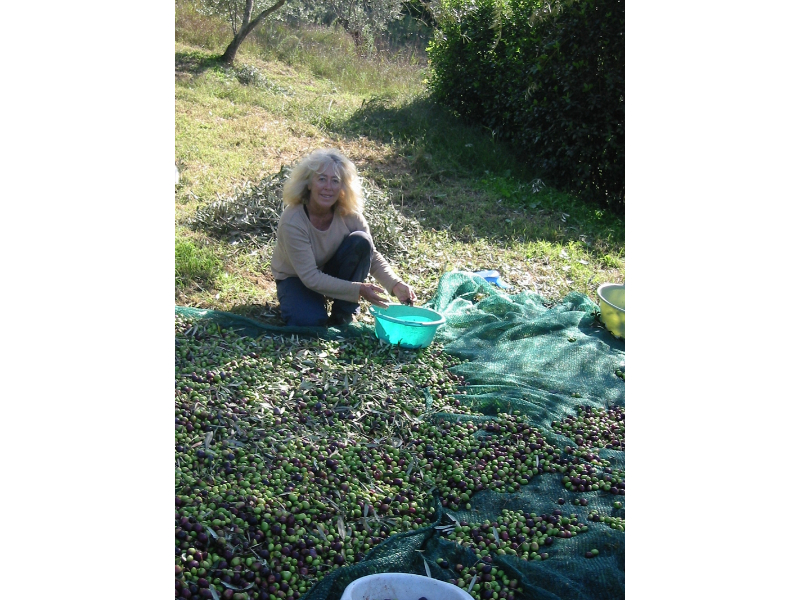
Lida picking olives
Once we had a good source of abundant water, we grew our own organic vegetables. For many years we did this commercially, but even when we stopped doing that, I always had a veggie garden every year. Everything we grew was pure; no pesticides, no herbicides, and no artificial fertilizer. Thus we knew that what we consumed was not going to be bad for us. We have always avoided "processed" food as we never knew what had been processed into that food. Also the packaging that came with supermarket processed food was always a problem to dispose of, and is now proving one of mankind's major challenges as we pollute the earth and oceans.

The market garden with certification as "Organic"

My much smaller house gardens
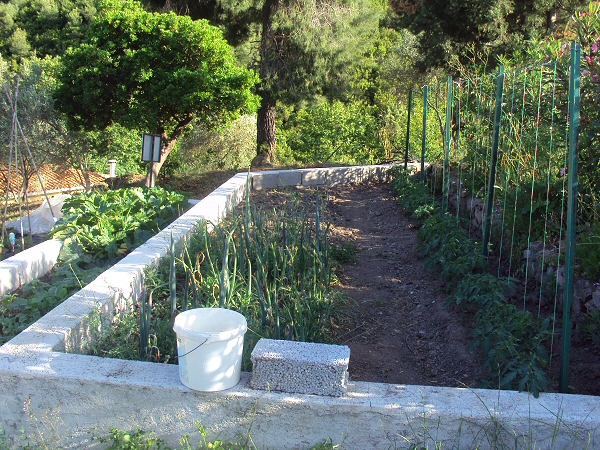
Every year we have added more compost, rotted manure, and worms to our vegetable garden areas, and the plants now grow to a really good size and give us far more than we can eat. It is our pleasure to give away excess produce to our friends and include them in earth's bounty.
<Back to contents> <Next chapter>